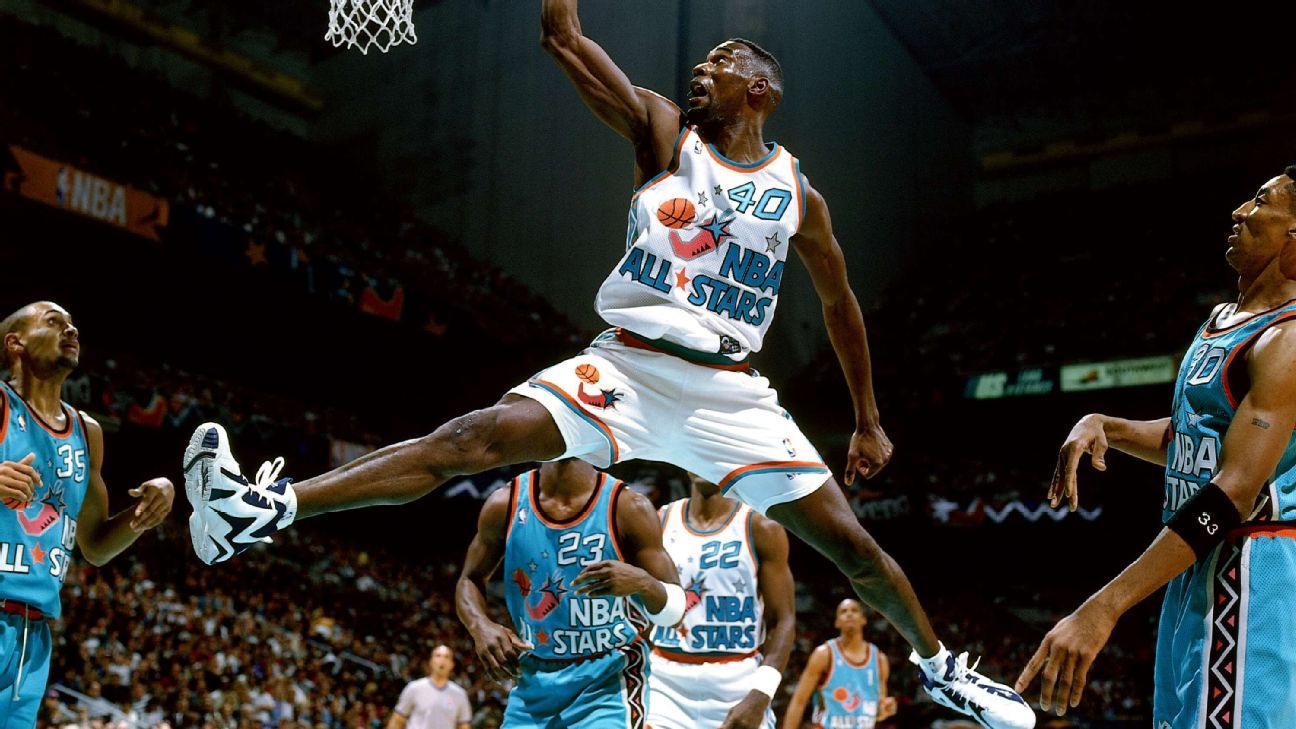The 2023 NBA All-Star Game is the 72nd edition of the midseason showcase — and this year’s version marks the 30th anniversary of the first NBA All-Star Game hosted by the Utah Jazz in 1993.
While hosting the league’s biggest stars on one court has been a constant for several decades, save for 1999, due to the NBA lockout, much has transformed since the game’s beginning in 1951.
One change that easily catches the eye of viewers is the ever growing number of uniform combinations that have been worn throughout the years
The 2022-2023 season has seen its fair share of fashion statements. Over 100 different uniforms have been worn throughout the Association, with teams each receiving four jersey editions: Association, Icon, City and Statement.
👀 New threads for the 2023 #NBAAllStar Game! pic.twitter.com/nvvgajEb0R
— #NBAAllStar (@NBAAllStar) January 27, 2023
In the sixth consecutive year of being outfitted by the Jordan Brand, All-Stars can add another jersey to their vast collection. But before that, here’s a look at how designs have evolved over the years.
1951: East 111, West 94
Location: Boston
MVP: Ed Macauley, Boston Celtics
All-Stars playing for the Eastern Conference sported a simple white jersey with blue accents, while players for the opposing conference wore the inverse in the inaugural game. The belt is perhaps the most distinguishing feature of the uniform, as elastic waistbands were not standard on basketball shorts during the 1950s.
1960: East 125, West 115
Location: Philadelphia
MVP: Wilt Chamberlain, Philadelphia Warriors
The design during the 1960s was similar to that of previous years. The additions of the East or West conference designation on the front of the jerseys was a distinction that became common later in the decade.
1967: West 135, East 120
Location: Daly City, California
MVP: Rick Barry, San Francisco Warriors
The latter end of the aforementioned decade brought in a new trend of honoring the city in which the game was played. The Warriors’ City edition uniforms served as the first source of inspiration for the new look.
1972: West 112, East 110
Location: Inglewood, California
MVP: Jerry West, Los Angeles Lakers
Players donned Lakers-themed outfits when the team’s then-home arena, the Forum, hosted the All-Star Game.
1980: East 144, West 136 (OT)
Location: Landover, Maryland
MVP: George Gervin, San Antonio Spurs
Washington was the final team to have its jerseys serve as the model for the showdown between the two conferences.
1985: West 140, East 129
Location: Indianapolis
MVP: Ralph Sampson, Houston Rockets
This style was quite popular, as the design was used for six consecutive years. It was even brought back after a short hiatus for the 2003 and 2004 All-Star Games.
1991: East 116, West 114
Location: Charlotte, North Carolina
MVP: Charles Barkley, Philadelphia 76ers
Arguably the most memorable All-Star uniforms were created in the 90s, starting with this version that was in use from 1991 to 1994.
1995: West 139, East 112
Location: Phoenix
MVP: Mitch Richmond, Sacramento Kings
Another recognizable design is a product of the past century. The vibrant colors were a stark contrast to the typical red, white and blue uniforms that were used for the majority of the All-Star Games’ existence.
1997: East 132, West 120
Location: Cleveland
MVP: Glen Rice, Charlotte Hornets
The decade was capped off with another well-known trend for the league’s midseason showcase. Players from the Eastern Conference wore their home jerseys, while those from the Western Conference wore their road uniforms.
2003: West 155, East 145 (2 OT)
Location: Atlanta
MVP: Kevin Garnett, Minnesota Timberwolves
This fan favorite design from the late 80s reemerged for two years in the early 2000s.
2004: West 136, East 132
Location: Los Angeles
MVP: Shaquille O’Neal, Los Angeles Lakers
The first style of the new millennium was distinguished by the diagonal lettering, but it was also the last time this format was used. Grand opening, grand closing.
2007: West 153, East 132
Location: Las Vegas
MVP: Kobe Bryant, Los Angeles Lakers
Cursive font made its return to the front of All-Star jerseys for the first time in over two decades, but this uniform was only used once.
2014: East 163, West 155
Location: New Orleans
MVP: Kyrie Irving, Cleveland Cavaliers
Sleeved jerseys were quite a fad upon being introduced in the 2013-14 season. They were also seen during the NBA’s Christmas Day slate, along with making an appearance at the All-Star Game. This style was only used once.
2015: West 163, East 158
Location: New York
MVP: Russell Westbrook, Oklahoma City Thunder
This minimalist design mirrors that of the All-Star Games’ earliest jerseys. It was the first time that black and white were the primary uniform colors, with the former representing the Western Conference and the latter being used for the Eastern Conference. Players’ first and last names were also printed on the back.
2018: Team LeBron 148, Team Stephen 145
Location: Los Angeles
MVP: LeBron James, Cleveland Cavaliers
This was the first year that the league adopted its current format, making East and West designations a thing of the past. Similar to the style used in 2015, black and white differentiates the two squads, but the logo of each player’s team is prominently displayed on the front.
